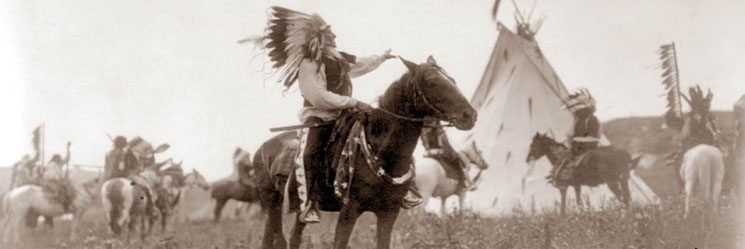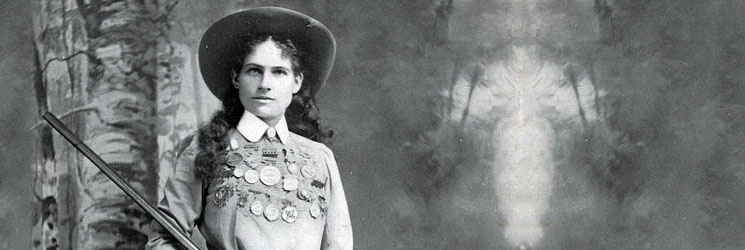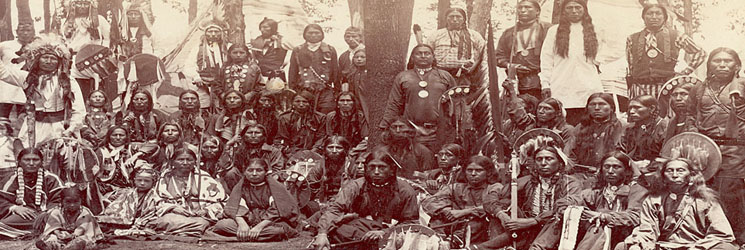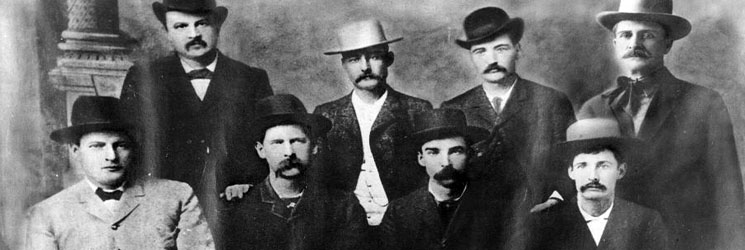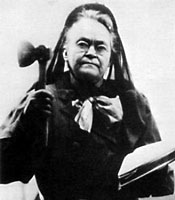
(November 25, 1846 – June 9, 1911)
Carry Nation is most famous for spearheading the Temperance movement (the battles against alcohol in pre-Prohibition America). She came from a troubled background: her mother was mentally ill and her husband was an alcoholic who drank himself to death. She remarried a lawyer named David Nation and soon after moving to Texas, she began having frequent visions.
Carry Nation then settled in Kansas and it was there that she organized the local chapter of the Women’s Christian Temperance Union. In 1899, she declared war on liquor and went about smashing up saloons and liquor selling stores with a hatchet. She was arrested repeatedly for her actions and others in the organization soon distanced themselves from her.
Background:
She was born Carrie Moore in Garrard County, Kentucky. The spelling of her first name is ambiguous; both “Carrie” and “Carry” are considered correct. Official records list the former, and Nation used that spelling most of her life; the latter was used by her father in the family Bible. Upon beginning her campaign against liquor in the early 20th century, she adopted the name Carry A. Nation mainly for its value as a slogan, and had it registered as a trademark in the state of Kansas. Nation also operated under the alias Mary Pat Clarke.
She was in ill health much of the time; her family experienced several financial setbacks and moved several times, finally settling in Belton, Missouri, where she was buried in the town’s cemetery. Many of Nation’s family members suffered from mental illness. Her mother went through periods where she had delusions and young Carrie was often tended to in the slave quarters as a result.
In 1865, Carry met Dr. Charles Gloyd, and they were married on November 21, 1867. Gloyd was an alcoholic and they separated shortly before the birth of their daughter, Charlien. He died less than a year later, in 1869. Nation attributed her passion for fighting liquor to her failed first marriage to the heavy-drinking Gloyd.
Carry acquired a teaching certificate but was unable to make ends meet in this field. She then met Dr. David A. Nation, an attorney, minister and newspaper editor, nineteen years her senior. They were married on December 27, 1877. The family purchased a 1,700 acre cotton plantation on the San Bernard River in Brazoria County, Texas, but both knew little about farming and the venture was unsuccessful. Dr. Nation became involved in the Jaybird-Woodpecker War and as a result was forced to move back north in 1889, this time to Medicine Lodge, Kansas, where he found work preaching at a Christian church, and Carrie ran a successful hotel.
It was here that Carry began her temperance work. She started a local branch of the Women’s Christian Temperance Union and campaigned for the enforcement of Kansas’ ban on the sales of liquor. Her methods escalated from simple protests to greeting bartenders with pointed remarks like “Good morning, destroyer of men’s souls,” to serenading saloon patrons with hymns on a hand organ. Dissatisfied with the results of her efforts, she began to pray to God for direction. And on June 5, 1900, she felt she received her answer in the form of a heavenly vision that she interpreted to mean she should take rocks – “smashers,” she called them – and proceeded to destroy 3 local saloons. At one, Dobson’s Saloon, she proclaimed: “Men, I have come to save you from a drunkard’s fate”. She then smashed the saloon’s stock with her cache of rocks. After similarly destroying two other saloons, a tornado hit eastern Kansas. This she took as divine approval of her actions.
Nation continued her destructive ways in Kansas, her fame spreading through her growing arrest record. After a raid in Wichita, her husband joked that she should use a hatchet next time for maximum damage. Nation replied, “That’s the most sensible thing you have said since I married you.”
Alone or accompanied by hymn-singing women, she would march into a bar and sing and pray, while smashing bar fixtures and stock with a hatchet. Between 1900 and 1910, she was arrested some 30 times for “hatchetations,” as she came to call them. Nation paid her jail fines from lecture-tour fees and sales of souvenir hatchets.
Nation later published a biweekly newsletter called “The Smasher’s Mail”, a newspaper titled “The Hatchet”, and still later in life appeared in vaudeville.
Near her end, she moved to Eureka Springs, Arkansas, where she founded the home known as Hatchet Hall. A spring just across the street from the house is named after her.
She collapsed during a speech in a Eureka Springs park and was taken to a hospital in Leavenworth, Kansas. She died there on June 9, 1911, and was buried in an unmarked grave in Belton City Cemetery in Belton, Missouri. The Women’s Christian Temperance Union later erected a stone inscribed “Faithful to the Cause of Prohibition, She Hath Done What She Could.”

